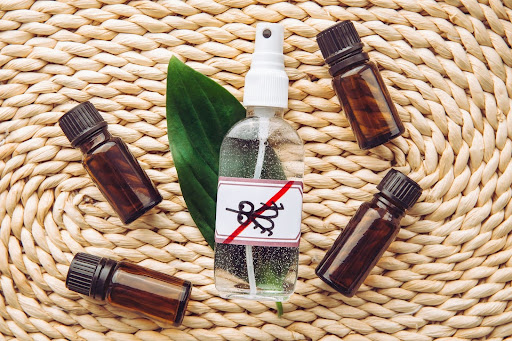As environmental concerns become increasingly pressing, businesses are reevaluating their practices to align with sustainable values. Traditional pest control methods often rely on harsh chemicals that pose risks to both health and the environment. The shift towards eco-friendly pest control is not just a trend; it’s a necessary evolution for responsible businesses.
Implementing eco-friendly pest control can significantly reduce environmental impact while promoting safety for families and pets. Moreover, businesses that adopt green practices gain an edge in customer trust and loyalty, positioning themselves as mindful leaders in their industries.
From understanding common natural remedies to exploring the benefits of eco-friendly pest control services, we will guide you through making informed decisions for your business. Let’s uncover why going green in pest control is not only beneficial for the planet but also vital for your business’s reputation and success.
- Benefits of Eco-Friendly Pest Control
- Common Natural and Organic Pest Control Methods
- Challenges of Traditional Chemical Pesticides
- Adding Eco-Friendly Pest Control Services
- Addressing FAQs about Organic Pest Control
- Utilizing Pest Control Software to Increase Profits
- Advantages of Using PestPac
- Closing Thoughts
Benefits of Eco-Friendly Pest Control

Eco-friendly pest control offers both environmental and personal health benefits that are increasingly important in today’s world. By focusing on sustainable practices, these methods prioritize the protection of natural ecosystems while providing effective pest management solutions. This approach not only benefits the planet but also enhances safety for families and pets and can improve customer trust and loyalty.
Reduced environmental impact
Green pest control products are designed to have a minimal impact on the environment compared to synthetic pesticides. By reducing harmful chemical runoff into waterways, these products help protect ecosystems and maintain the balance of biodiversity. Sustainable pest control practices further prevent disturbances to the natural balance, enabling wildlife and beneficial insect populations to thrive. Implementing these methods not only minimizes environmental harm but also reduces reliance on chemical interventions.
Enhanced safety for families and pets
Eco-friendly pest control methods use materials with low environmental impact, ensuring a safer environment for both families and pets. Traditional pesticides pose health risks such as skin irritation and respiratory issues; in contrast, natural pest control solutions avoid these hazards by using non-toxic ingredients. Integrated Pest Management (IPM) reduces chemical pesticide reliance, safeguarding human and pet health through diverse treatment strategies. Consequently, organic pest control solutions effectively manage pests while keeping families and pets safe.
Improved customer trust and loyalty
Adopting eco-friendly pest control methods enhances customer trust through a visible commitment to sustainability. By using non-toxic products, businesses increase customer confidence, assuring them of their household’s safety. Highlighting preventative practices and involving customers in managing pest-free environments builds loyalty, making clients active participants in pest control. Prioritizing reduced chemical treatments and maintaining transparency about methods further strengthens connections with environmentally conscious customers.
Common Natural and Organic Pest Control Methods
Natural and organic pest control methods focus on managing pests in a way that is safe for the environment, humans, and non-target species. Biological control is a key technique, utilizing natural enemies like pathogens, parasitoids, and predators to keep pest populations in check. Barrier control methods can include sealing entryways and setting natural traps, which are practical for creating a defensive perimeter against pests. Organic options often involve biological ingredients, such as natural oils, in combination with safer chemicals, resulting in eco-friendly and effective solutions. Integrated Pest Management (IPM) supports these methods by integrating habitat modification and biological controls to curtail pest activity naturally.

Prevention techniques
IPM is an effective strategy for long-term pest prevention, leveraging biological control, habitat adjustment, and cultural practices. This system monitors pests closely and uses pesticides only when absolutely necessary, reducing reliance on harsh chemicals. Natural pesticides and repellents can deter pests by removing their food sources and creating inhospitable conditions. Maintaining cleanliness with regular sanitation reduces the chances of pest infestations by eliminating their access to food and water.
Traps and barriers
Traps serve as both an active and passive form of pest control by drawing pests in with bait, such as food or scents. Physical barriers like window screens and door sweeps effectively prevent pest entry when installed correctly. Regularly inspecting for and sealing potential entry points with caulk or weatherstripping can enhance these measures. Using non-toxic traps, such as glue boards and snap traps, offers a safe alternative to chemical methods. Consistent cleaning and securing of food and water sources further support the success of these barriers and traps.
Natural repellents (e.g., neem oil, diatomaceous earth)
Neem oil offers a versatile organic solution with anti-feeding and insecticidal properties. It can be applied directly to pests or used as a foliar spray or soil drench to protect plants. Diatomaceous earth is a natural substance that causes structural damage to pest exoskeletons, dehydrating them over time. This method is effective yet safe for use around humans and pets. Pyrethrin, derived from daisies, is another botanical insecticide option, though caution is needed to avoid harming beneficial insects. Natural products like neem oil and diatomaceous earth provide eco-friendly alternatives to traditional chemical-based control methods.
Get Started With Pest Control Software!
Challenges of Traditional Chemical Pesticides
Traditional chemical pesticides have been a go-to solution for pest control; however, they come with a range of challenges. These include significant health risks, environmental concerns, and the potential for pests to develop resistance. Recognizing these issues is crucial for those seeking safer and more sustainable pest control alternatives.

Health risks associated with chemicals
Traditional pest control methods often involve harsh chemicals, which can cause severe health issues like cancer, birth defects, and neurological damage. These chemicals can release volatile organic compounds that exacerbate respiratory problems, especially in poorly ventilated areas.
Environmental concerns
The environmental impact of chemical pesticides is significant. These substances often harm non-target species, including beneficial insects such as honeybees and ladybeetles. Eco-friendly pest control solutions, utilizing non-toxic pesticides and integrated strategies, provide an effective alternative by minimizing harm to the environment and reducing chemical exposure risks in humans.
Resistance development in pests
Pests exposed repeatedly to the same chemical pesticides can develop resistance over time, rendering conventional treatments ineffective. Eco-friendly pesticides, derived from natural sources, tend to avoid this issue due to historical pest exposure to these substances. By incorporating prevention and exclusion strategies along with botanical pesticides, eco-friendly methods offer sustainable pest control solutions that limit resistance development.
Adding Eco-Friendly Pest Control Services
A critical aspect of successfully offering eco-friendly pest control is effectively communicating its benefits to your clients. Developing well-crafted marketing materials that outline both the safety and efficacy of eco-friendly approaches is essential. Here are some key strategies to convey these benefits:
Safety First: Health Benefits for Families and Pets
When marketing eco-friendly pest control, stress the importance of safety. Traditional pest control methods often use harmful chemicals that can lead to health problems for both humans and pets. Highlight that eco-friendly alternatives rely on natural substances, drastically reducing the risk of exposure to toxic agents. You can present statistics on the safety of these methods or provide case studies that demonstrate their effectiveness without compromising health.
Environmental Protection
The environmental impact of conventional pest control cannot be overstated. Eco-friendly pest control practices utilize sustainable methods that prevent damage to beneficial wildlife and minimize pollution. Clearly explain in your materials how these methods contribute to a healthier ecosystem and advocate for the responsible use of resources. Share insights into how even small choices in pest control can lead to broader positive changes in environmental preservation.
Proven Efficacy
Many clients may worry about the effectiveness of eco-friendly pest control methods compared to traditional methods. Address these concerns head-on by sharing evidence and success stories that highlight the performance of non-chemical treatments. Offer case studies that showcase how businesses and homeowners have successfully dealt with pests using eco-friendly strategies. Emphasizing customer testimonials can further validate these claims, illustrating real-world examples of the benefits associated with green pest control.
Training staff on eco-friendly methods
Training staff on eco-friendly pest control methods equips them with crucial knowledge for sustainable practices. Programs like Our Water, Our World (OWOW) provide education on IPM and less-toxic alternatives, encouraging an environmentally conscious mindset. Staff trained in eco-friendly methods learn to recognize and utilize beneficial insects for natural pest control and promote habitat restoration. Understanding the harmful effects of traditional pesticide use on water quality helps foster a more sustainable pest management approach.
Marketing your green initiatives
Promoting your eco-friendly pest control practices requires effectively marketing the benefits of using natural, earth-based materials, such as borates and botanical insecticides. Verifying green service claims on websites ensures alignment with customer expectations and fosters trust. Educating customers about the ecological balance maintained through sustainable practices enhances your green initiatives’ appeal. By emphasizing the connection between traditional chemical treatment use and its harmful effects, companies can appeal to environmentally conscious consumers and encourage responsible consumption.
Addressing FAQs about Organic Pest Control
Organic pest control is a growing field that prioritizes reducing environmental impact while effectively managing pest populations. Typically, these solutions involve using bait traps and natural ingredients like oils, combined with safer chemicals. This approach minimizes harm to the environment and provides a sustainable alternative to traditional chemical pest control methods.
Efficacy of natural methods
Natural pest control methods can be effective, but they often require larger quantities compared to conventional chemical solutions. For example, neem oil is a natural product that can deter insects when sprayed on plants. Similarly, diatomaceous earth dehydrates pests, offering a chemical-free pest solution. Despite the need for more products, these methods contribute to reducing pest resistance, as seen with harsh chemicals.
Safety considerations
Safety is a key consideration in eco-friendly pest control. Many of these products have been deemed safe by regulatory bodies like those in California due to their low toxicity. However, precautions are necessary, such as following instructions for natural repellents like hot pepper spray. Additionally, good sanitation and maintenance practices can prevent pest infestations, enhancing safety by removing potential sources of food and water.
Long-term benefits vs. immediate results
Eco-friendly pest control services often yield immediate results, with improvement seen shortly after application. Long-term benefits include reduced pest tolerance due to less frequent chemical use, ensuring sustainable pest management. Integrated Pest Management (IPM) strategies support ongoing control by emphasizing prevention and reduced chemical dependence, protecting both environmental and human health over time.
Utilizing Pest Control Software to Increase Profits
Using specialized pest control software such as PestPac can benefit pest control companies aiming to boost their profits and looking for business growth. Integrated pest management platforms are designed to streamline operations, improve efficiency, and provide valuable business insights that can lead to increased revenue, an essential business goal.
Advantages of Using PestPac
PestPac is a specialized software solution for pest control companies. Using PestPac can provide various advantages to your company, such as:
1. Increased efficiency: Streamlines various aspects of pest control operations, such as scheduling, billing, and customer communication. This can help businesses save time and resources by automating repetitive tasks and allowing technicians to focus on providing quality service to customers.
2. Improved customer service: Businesses can easily access customer information, history, and preferences, allowing them to provide personalized pest control service and build stronger relationships with their clients. This can lead to higher customer satisfaction and retention rates.
3. Enhanced accuracy: Keeps track of all pest control treatments performed, products used, and scheduling information, reducing the risk of errors or oversights. This ensures that technicians are following proper protocols and providing effective pest control solutions.
4. Reporting and Analytics: Offers valuable reporting and analytics capabilities, allowing businesses to track key performance metrics, identify trends, and make data-driven decisions. By analyzing this data, companies can optimize their operations, improve efficiency, and ultimately increase their bottom line.
Closing Thoughts
Adopting eco-friendly pest control methods is a crucial step in safeguarding both our environment and health. By steering clear of harsh chemicals and opting for natural alternatives, like botanical insecticides and biological controls, we can effectively manage pest populations while minimizing harm to the ecosystem. Integrated Pest Management and organic solutions are at the forefront of this green movement, providing a strategic framework to address pest infestations responsibly. For pest control businesses, leveraging software like PestPac can significantly enhance operational efficiency. PestPac streamlines scheduling, tracks pest activity, and helps manage customer communications, enabling companies to provide timely and effective eco-friendly pest control services. This not only improves customer satisfaction but also helps reduce the environmental impact of traditional pest control methods. Ready to take your pest control operation to the next level? Book your free demo today!




